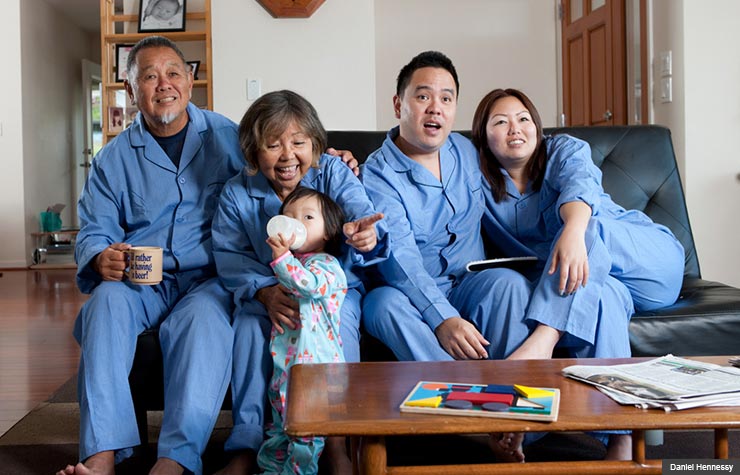
3 generations under one roof - multigenerational homes, american famil...
- Select a language for the TTS:
- UK English Female
- UK English Male
- US English Female
- US English Male
- Australian Female
- Australian Male
- Language selected: (auto detect) - EN
Play all audios:

"Families may be coming together because of the economy," says Donna Butts, executive director of Generations United, "but they're staying together because it helps them
all." Jason Ng, 38, his girlfriend, Jamie Sonoda, 30, and their 20-month-old baby, Addison, live in a home he and his parents rebuilt on their property in Aiea, Hawaii. His mother,
Karen, 64, has dubbed the den "the nest," because she and her husband, Melvin, 69, have private space to watch TV. The two couples split bills equally: mortgage, utilities and
groceries. Karen and Melvin adore caring for their granddaughter during the week when Jason and Jamie are at work, and don't charge the new parents. "I dream of having my own
house, but the land in Hawaii is expensive," says Jason. "If I moved where it's cheaper I'd have a 1.5-hour commute. I love where I grew up, and a comparable house goes
for $700,000 to $800,000. We got everything we wanted for $500,000 and split that. And we live in the same house as my parents, so if there's an emergency, I'm right here."
THEN, THE CHALLENGES But the multigenerational housing scenario is not so rosy for everyone. Family friction, strain on spouses, and less opportunity for work and personal time are very real
concerns. Kris Radjewski's 92-year-old mother-in-law has lived with her, Kris' husband, Ed, 55, and their 14-year-old daughter, Lexi, in Lake Hopatcong, N.J., for 13 years. The
elder Mrs. Radjewski has taken over the family room in the basement, where Kris' older daughter, now away at school, would entertain friends. Now Lexi feels she has no space for hers.
"She's fed up and wants her life back," says Kris, 50. "My daughter needs her mom, and I'm either working or taking care of Grandma." Ofelia Ramirez, 37, a
housecleaner from Kyle, Texas, can relate. She has the 24/7 company of her husband, 42, her children, ages 16, 14, 7 and 6, and her 80-year-old mother-in-law. "The kids like having her
around and we get to share a lot of memories," says Ramirez. The downside is unsolicited advice about how to raise her children and feeling she can't have their own friends over
for dinner. And yet, on days her mother-in-law is not around, "it feels like somebody is missing." Ellen Lewis, 49, of Leonardtown, Md., describes having her mom, now 78, live with
her, her second husband and her four kids, ages 10 to 20, as "not bliss, but it's not hellish either." Lewis, who owns two knitting shops, says her parents (her dad died in
2001) were incredibly helpful when she was raising her kids, dealing with a failing first marriage and then dating her future husband. "But the dynamic has changed a lot over the years.
You can't look at this as an equal relationship," she says. "It's OK. It's my time to take care of her. I have to remember the good times. I don't want to see
her in a nursing home." _Sally Abrahms writes about aging and boomers. She is based in Boston._
